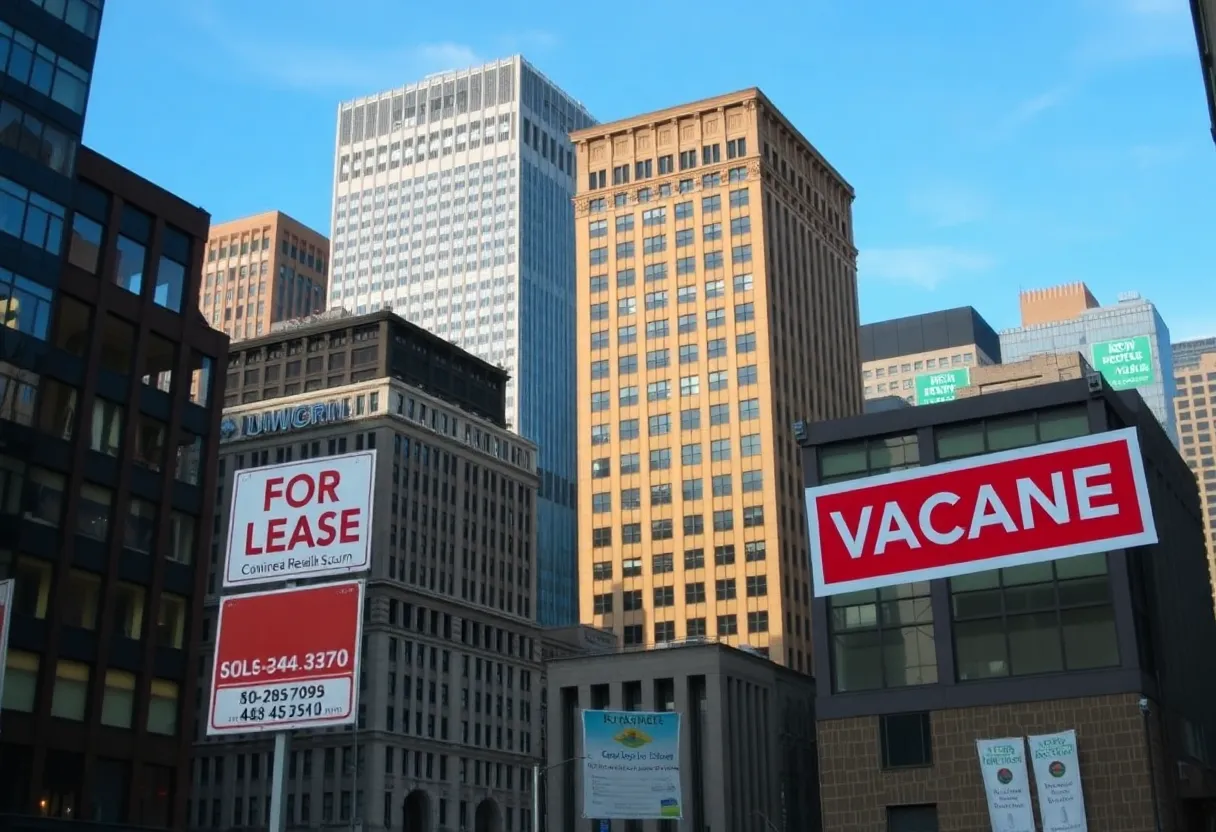Boston, August 22, 2025
News Summary
In light of rising vacancy rates and declining market values, commercial property owners in Boston are filing appeals to lower their property tax assessments. The number of appeals has surged dramatically, reflecting the stressful market conditions faced by landlords amidst broader national declines in office valuations. These developments raise concerns about significant reductions in property tax revenues that heavily support city finances. The city mayor has proposed raising the commercial property tax rate to address this shortfall, pending state-level approval.
Boston
Office building owners in Boston are formally challenging property tax assessments as vacancy rates climb and market values fall, raising the prospect of large drops in city property-tax revenue.
What happened: Dozens of commercial property owners have filed appeals to lower assessed values after years of tenant losses and lower market prices. The surge in appeals comes as Boston’s office vacancy and broader national declines in office valuations put pressure on owners and municipal revenues that rely heavily on property taxes.
Key developments
- Owner actions: A local owner of four Boston office buildings reported an aggregate decline in assessed values of about 12% over the past two years and has submitted formal challenges arguing that some individual properties should be discounted by roughly 50%.
- Appeals surge: Landlords filed appeals for 388 commercial properties in 2023, an 83% increase from 212 appeals the year before and more than double the 180 appeals in the prior year.
- Low success rate so far: As of last month, only 11 of the 388 appeals had been granted.
- Example reduction: One property owned by KS Partners received an agreed reduction in assessed value of nearly $2 million from a $14.2 million assessment after the property reported roughly a two-thirds vacancy rate.
Market context and risks to city finances
Vacancy and value trends: Boston’s office vacancy has risen sharply since the pandemic. Recent figures place vacancy near 18.8%, up from about 14% in mid-2023 and more than double pre-pandemic levels when vacancy was below 8%. Separate 2025 reporting noted a 17.1% vacancy rate for the year, reflecting differences in reporting windows and data sources. Despite those increases, Boston remains one of the tighter office markets in the U.S. and the only northeastern city reporting annual rent growth, with average asking rent around $47 per square foot.
National picture: Office values nationwide have fallen about 37% from their 2022 peak, a decline that has led to foreclosures and numerous properties selling at significantly lower prices. The national office vacancy rate was reported at 19.7% in February 2025, up 180 basis points year-over-year, while the national average listing rate increased 5.7% year-over-year to $33.41 per square foot. About 48.6 million square feet of office space remained under construction across the country.
Fiscal exposure: Property taxes provide more than 70% of Boston’s local revenue. A June report by the Boston Policy Institute and Tufts University projected that assessed values in Boston could fall by as much as 45% from 2024 levels, which the report translated into a projected $1.7 billion drop in property-tax revenue over the next five years. The report also noted that this projection changes an earlier forecast figure of $1.5 billion.
Policy response and legislative status
City proposals: The city’s mayor has proposed raising the commercial property tax rate to offset part of the revenue shortfall caused by falling office valuations. That proposal requires approval at the state level. A previous bill proposing property tax adjustments was rejected by state senators after opposition from business groups. The mayor refiled a revised bill in January, but it had not passed as of the most recent updates.
Comparisons with other markets
Regional and national comparisons: Boston’s average asking rent of about $47 per square foot contrasts with Manhattan’s higher average of $68.93 per square foot, though Manhattan experienced a 3.6% year-over-year decline in rent. Philadelphia reported a lower average rent—$30.86 per square foot—and a higher vacancy rate near 20%, exceeding the national average. Investors have been focusing on markets such as Boston that still show relative rent growth and tighter supply conditions despite the broader sector weakness.
Immediate implications
- Property owners are pursuing assessment reductions to reflect lower market values and vacancy.
- Municipal revenue forecasts are being revised and debated, increasing pressure on municipal budgets and tax policy decisions.
- State-level action is required to change tax rates, and legislative uncertainty remains.
- Commercial real-estate market dynamics continue to vary by city, with Boston showing both stress and relative strength compared with some peer markets.
Background
The COVID-19 pandemic accelerated remote and hybrid work trends that drove tenant contractions in many downtown office markets. As companies reassess space needs, owners and municipalities face an uneven recovery. The interaction of appeals, administrative rulings, market transactions, and state tax policy will determine how quickly assessed values and municipal revenue stabilize or decline further.
Frequently Asked Questions
How many commercial property tax appeals were filed in Boston in 2023?
Landlords filed appeals for 388 commercial properties in 2023, an increase of 83% from 212 appeals in the previous year.
How many appeals have been granted so far?
As of last month, 11 of the 388 appeals filed in 2023 had been granted.
How much could Boston’s property-tax revenue fall?
A June report from the Boston Policy Institute and Tufts University projects a potential $1.7 billion drop in property-tax revenue over the next five years under a scenario of sharply reduced assessed values; the report also noted a revision to an earlier forecast figure of $1.5 billion.
What are current vacancy and rent figures for Boston offices?
Recent measures place Boston’s office vacancy near 18.8%, up from about 14% in mid-2023. Boston’s average asking rent is roughly $47 per square foot, and the city remains one of the tighter office markets nationally.
How does the national office market compare?
Nationally, office values have fallen about 37% from their 2022 peak. The national vacancy rate was 19.7% in February 2025, and the average listing rate rose to $33.41 per square foot year-over-year.
What actions has city leadership taken?
The mayor has proposed raising the commercial property tax rate to compensate for falling office assessments. That change requires state approval; an earlier bill failed in the state senate and a revised bill was refiled in January but has not yet passed.
Quick Reference Table
| Metric | Value / Note |
|---|---|
| Commercial appeals filed (2023) | 388 |
| Appeals granted (as of last month) | 11 |
| Example assessment reduction (KS Partners) | Reduction near $2 million from $14.2 million due to ~66% vacancy |
| Reported Boston vacancy (recent) | 18.8% (also reported at 17.1% for 2025 in another measure) |
| Boston average asking rent | $47 per square foot |
| National vacancy (Feb 2025) | 19.7% |
| National office value change since 2022 peak | -37% |
| Projected Boston property-tax revenue drop | $1.7 billion over five years (per June report) |
| Potential assessed-value decline (scenario) | Up to 45% from 2024 levels (per June report) |
| National average listing rate | $33.41 per square foot (up 5.7% YoY) |
| Office space under construction (U.S.) | 48.6 million sq ft |
| Comparison rents | Manhattan: $68.93/sq ft; Philadelphia: $30.86/sq ft |
Deeper Dive: News & Info About This Topic
HERE Resources
Boston Mayoral Race Intensifies with Major Super PAC Contributions
Boston City Council Forms Commission to Tackle Office Vacancies
Boston Faces $1.7 Billion Decline in Commercial Property Tax Revenue
Boston City Council Approves $4.8 Billion Budget
Boston Property Owners Face Hidden Tax Penalties
Boston Commercial Property Owners Face Rising Taxes After Appeals
Additional Resources
- Bisnow: Hundreds of Landlords Appeal Assessments of Boston Offices
- Wikipedia: Commercial Real Estate
- Bloomberg: Boston Tax Hit from Office Market Slump
- Google Search: Boston office market
- Colliers: Greater Boston Office Report 2025 Q1
- Google Scholar: Boston office vacancy rate
- Boston Real Estate Times: National Office Market Trends
- Encyclopedia Britannica: Real Estate
- Live Mint: Crazy Vacancies Force Boston Landlords to Fight Valuations
- Google News: Boston property taxes

Author: STAFF HERE BOSTON WRITER
The BOSTON STAFF WRITER represents the experienced team at HEREBoston.com, your go-to source for actionable local news and information in Boston, Suffolk County, and beyond. Specializing in "news you can use," we cover essential topics like product reviews for personal and business needs, local business directories, politics, real estate trends, neighborhood insights, and state news affecting the area—with deep expertise drawn from years of dedicated reporting and strong community input, including local press releases and business updates. We deliver top reporting on high-value events such as Boston Marathon, Head of the Charles Regatta, and Boston Harborfest. Our coverage extends to key organizations like the Greater Boston Chamber of Commerce and Associated Industries of Massachusetts, plus leading businesses in finance, biotech, and insurance that power the local economy such as Fidelity Investments, Biogen, and Liberty Mutual Insurance. As part of the broader HERE network, we provide comprehensive, credible insights into Massachusetts's dynamic landscape.



